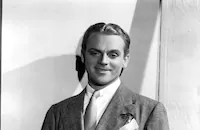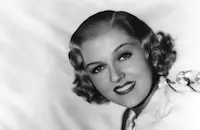Picture Snatcher

Brief Synopsis
Cast & Crew
Lloyd Bacon
James Cagney
Ralph Bellamy
Patricia Ellis
Alice White
Ralf Harolde
Film Details
Technical Specs

Synopsis
When Danny Kean gets out of Sing Sing Prison, he decides to go straight. He leaves behind his old gang to become a reporter and lands a job on the Graphic News , a scandal sheet, after stealing a photograph that no one else was able to get. News reporter Allison invites Danny over one night, but he leaves quickly when he finds out that she has been dating his editor, McLean. Danny is attracted to journalism student Patricia Nolan, the daughter of Lieutenant Casey Nolan, a policeman who knew Danny in his criminal days. Nolan forbids Patricia to have anything to do with Danny until McLean convinces another paper to run a flattering article on Nolan, who is then promoted to captain. Danny learns that Nolan will be in charge of the execution of a woman at Sing Sing. His paper has not been invited to witness the event, so he steals another reporter's invitation and talks Nolan into letting him view the execution. He photographs the death with a camera strapped to his leg. The other reporters discover his trick and chase after him, but he escapes and the photograph is published. Nolan is demoted because of Danny's actions, and Patricia refuses to talk to him. McLean is also angry when he finds Allison embracing Danny. Danny is so down that he goes on a long drunk. Finally McLean, who has quit drinking himself, tracks down Danny. When they learn that Jerry, an old member of Danny's gang, shot two policemen, they decide to go after him. Danny succeeds in finding Jerry, but before he can leave, the police arrive and Jerry is killed in the shootout. Taking advantage of the moment, Danny photographs the whole thing and credits Nolan with the idea. Danny and McLean sell the photos, getting new jobs in the process, and Patricia and Danny reunite.

Director

Lloyd Bacon
Cast

James Cagney

Ralph Bellamy

Patricia Ellis

Alice White

Ralf Harolde
Robert E. O'connor

Robert Barrat
George Pat Collins
Arthur Vinton

Sterling Holloway

Tom Wilson
Barbara Rogers
Renee Whitney
Alice Jans
Jill Dennett
Crew

Photo Collections
Videos
Movie Clip



Trailer
Film Details
Technical Specs

Articles
The Picture Snatcher - The Picture Snatcher
Completed in fifteen days by director Lloyd Bacon, Picture Snatcher has a breakneck pace that is perfectly in keeping with its subject and marked the first time Bacon and Cagney worked together; they would make eight more pictures together including Footlight Parade (1933). According to the actor in his autobiography Cagney on Cagney, Lloyd's directing methods were expedient to say the least. After running through his lines with co-star Ralph Bellamy for one scene, Cagney "heard Lloyd yell, "Cut - print it!" I said, "Hey, you - I was rehearsing!" "It looked fine from here," he said. That was the ultimate efficiency - shooting a damned rehearsal!"
The major inspiration for Picture Snatcher was the shocking image of convicted murderess Ruth Snyder being executed at Sing Sing on January 12th, 1928; The New York Daily News immortalized Tom Howard's photograph the following day. In the film's major set piece, Cagney smuggles his camera into prison, hidden in his pant's leg at the ankle, and snaps the floor level shot at the moment the switch is thrown. While this scene is a close imitation of the actual execution (you can see the original photograph in New York Noir: Crime Photos from the Daily News Archive (Rizzoli) by William Hannigan), no reference is made to Ruth Snyder or the actual case in the film.
As for Cagney's screen reputation for playing rough with the ladies, it's in full bloom here as he receives a slap from Alice White (cast as Allison, the chief editor's mistress) and retaliates with a knuckle sandwich. During the filming of the scene, Cagney carefully coached the actress on how to fake it for the camera but when it came time to shoot it, White accidentally leaned forward slightly and took the punch full force. Cagney recalled, "And there was poor little Alice down on the floor, crying her heart out. I was mighty sorry to have hit that cute little kisser."
The situation was reversed, however, when it came time for Bacon to shoot a slugfest between Cagney and Bellamy. In his autobiography, When the Smoke Hit the Fan, Bellamy revealed, "I was to hit him in the jaw. In rehearsal I threw a fist across his face in a close shot over my shoulder, just showing the back of my head and his full face. Jim has done quite a bit of boxing. He said, "Aim at my chin right here." And he pointed to the left side of his chin. "Don't worry," he continued. "I'll ride the punch. I'll be out of your way. You won't touch me!" We did a take. I aimed at his chin, hit the side of his face and broke a tooth." Cagney later wrote, "You have yet to see a more disconsolate man than Ralph Bellamy that day. "I told you I've never thrown any punches," he said, "I've never hit anybody in my life." "You sure as hell have now," I told him, "so don't worry about it." "I'll never do it again," he said and as far as I know he never has."
Producer: Raymond Griffith
Director: Lloyd Bacon
Screenplay: Daniel Ahern (story), William Keighley, Ben Markson, Allen Rivkin, P.J. Wolfson
Cinematography: Sol Polito
Film Editing: William Holmes
Art Direction: Robert M. Haas
Music: Cliff Hess
Cast: James Cagney (Danny Kean), Ralph Bellamy (McLean), Patricia Ellis (Patricia Nolan), Alice White (Allison), Ralf Harolde (Jerry), Robert Emmett O'Connor (Casey Nolan).
BW-77m. Closed captioning.
by Jeff Stafford

The Picture Snatcher - The Picture Snatcher
Quotes
Trivia
The scene of Danny photographing an execution is based an actual incident in which New York crime photographer Tom Howard surreptitiously snapped the famous photo of convicted murderess Ruth Snyder's execution in the electric chair.
Notes
According to Variety, the scene in which Danny photographs the execution was based on an actual incident in which a photo was taken secretly at the execution of Ruth Synder and printed in a New York newspaper. Contemporary reviews mentioned the aggressive sexuality of several women characters. The role of Allison was designed as a comeback part for Alice White. Modern sources list the following additional crew credits: Assistant Director Gordon Hollingshead; Makeup Perc Westmore. Modern source cast credits include Billy West and George Chandler (Reporters), George Daly (Machine gunner), Stanley Blystone (Prison guard), Don Brodie (Hood), Donald Kerr (Mike), Hobart Cavanaugh (Pete), Phil Tead (Reporter Strange), Charles King (Sick reporter), Milton Kibbee (Reporter outside prison), Dick Elliott and Vaughn Taylor (Editors), Bob Perry (Bartender), Gino Corrado (Barber), Maurice Black (Speakeasy proprietor), Selmer Jackson (Record editor), Jack Grey (Police officer), John Ince (Captain) and Cora Sue Collins (Little girl). The film was remade by Warner Bros. in 1942 as Escape from Crime, starring Richard Travis and directed by D. Ross Lederman.















